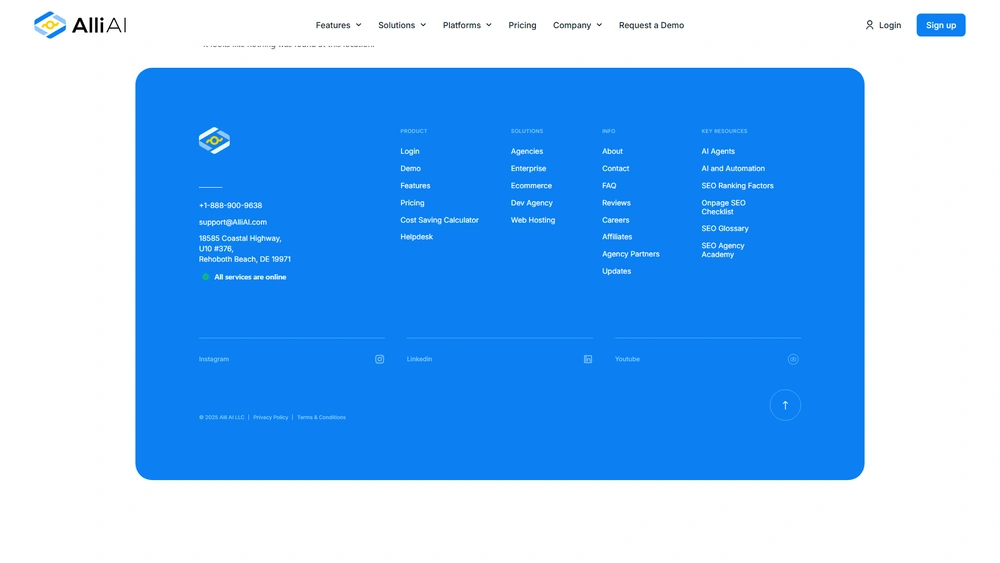Alli AI Overview & 2026 Industry Position
Alli AI is a modern SEO automation platform engineered for marketers, agencies, and businesses that want to streamline search optimization across large websites. In 2026, as SEO becomes increasingly affected by AI-driven search (like Google SGE and Bing Copilot), Alli AI positions itself as a central control panel for rapid, site-wide SEO implementation and experimentation. Its intuitive interface and aggressive automation capabilities reduce technical barriers while driving organic performance. The platform’s core tools around content optimization, link management, and live-editing functionality give it a notable edge in the busy SEO software market.
From Launch to 2026: Alli AI’s Journey
Originally launched in 2019 as an on-page SEO analytics tool, Alli AI evolved rapidly to meet the growing demand for intelligent automation. Key milestones:
- 2019 – MVP launch with real-time on-page SEO diagnostics
- 2020 – Introduced in-browser SEO suggestions and Chrome plugin
- 2021 – Released autonomous optimization engine for WordPress sites
- 2022 – API and team collaboration features introduced
- 2023 – Shifted to full site editor with live code override
- 2024 – Alli AI supports generative SEO tasks and LLM-based keyword suggestions
In 2026, Alli AI is focused on becoming the “AI webmaster” of tomorrow — offering not just analytics but full control for marketers to test, optimize, and execute SEO strategy at scale with zero technical dependency.

Alli AI Key Features
At its core, Alli AI combines SEO automation with site-level control to drive scalable growth. Key standout features in 2026 include:
- Visual Page Editor – Modify HTML, meta, schema, headers, and links without touching code
- Autopilot Optimization – Let Alli AI identify and implement recommendations automatically
- Mass Deploy – Make SEO changes across hundreds or thousands of pages instantly
- Live Diagnostics – In-browser recommendations and real-time site grading
- Team Collaboration – Granular permissions for users, roles, and approvals
- Generative SEO Copy – LLM-backed suggestions for meta titles, descriptions, and H1s
Workflow & UX
One of Alli AI’s strongest attributes is its UX. The dashboard organizes campaigns by domains, and within each domain, users can access a unified canvas for editing code, tracking issues, and deploying fixes. Navigation is tab-based, with natural segmentation by meta tags, link modules, content, and schema. Edits go live within seconds, making test-and-iterate SEO possible even for non-developers.
Pro Tip: Use the Mass Deploy tool during off-peak hours to roll out title tag changes site-wide without performance penalties.
Alli AI Pricing Analysis & Value Metrics
As of July 2026, Alli AI offers four subscription tiers. All plans are billed monthly or annually with discounts for annual prepay.
| Plan | Price | Key Inclusions |
|---|---|---|
| Starter | $99/mo | 1 website, 10K pages, live editor, Autopilot |
| Pro | $199/mo | 3 websites, 50K pages, Team access, AI copywriting |
| Agency | $499/mo | 10+ websites, 250K pages, white-label, API access |
| Enterprise | Custom | Unlimited domains/pages, SSO, dedicated support |
Value Assessment: For SMBs and agencies, the Pro and Agency plans offer excellent ROI by eliminating the need for expensive SEO contractors or developers for implementation.
Competitive Landscape
Key competitors to Alli AI in 2026 include:
| Platform | Strengths | Weaknesses |
|---|---|---|
| Surfer SEO | Content optimization via AI | No automation, requires manual deployment |
| SEMrush | All-in-one marketing suite | High learning curve, not focused on execution |
| Yoast + Elementor | Popular for WordPress | Manual updates, limited multi-site control |
| Alli AI | Execution + automation | Less robust on initial competitive research |
Use Cases & Ideal Customers
Alli AI excels in scenarios where speed, scale, and simplicity are crucial:
- SEO agencies managing dozens of client sites
- E-commerce brands optimizing thousands of SKUs
- Franchise or multi-location businesses with templated content
- Startups needing fast SEO wins without staffing developers
Integrations & API Capabilities
Alli AI integrates seamlessly with many CMSs and platforms, including:
- WordPress, Shopify, Webflow, Wix
- Google Analytics & Google Search Console
- Zapier for workflow automation
- Custom API for internal tools and dev teams
Pros & Cons
- ✔ Powerful automation: Scalable SEO without manual updates
- ✔ Visual editor: Direct site editing without dev teams
- ✔ Active development: Monthly feature drops and fast support
- ✖ Price tiers can escalate: High-traffic sites may need Enterprise
- ✖ Limited keyword research suite: Best paired with Surfer or Ahrefs
Final Thoughts
With AI leading 2025’s SEO wave, Alli AI emerges as a platform built for execution-first teams. If you’re looking to Alli AI optimize campaign output across thousands of pages — without code — it’s a compelling solution. Not ideal for solo operators who want integrated research tools, but for agencies and in-house teams, it’s a game-changer. Expect execution velocity, not just data dashboards.
Alli AI FAQ
Yes, Alli AI works seamlessly with WordPress and can deploy changes live without plugins or manual edits.
Absolutely. The platform includes AI-powered meta generation based on URL context and keyword targeting.
Most edits go live within 60 seconds, depending on your CMS and connection setup.
Yes, you can add or modify structured data directly from the live editor — no coding required.
High-scale sites like eCommerce, media publishers, SaaS platforms, and agency-managed domains benefit most from using Alli AI.

